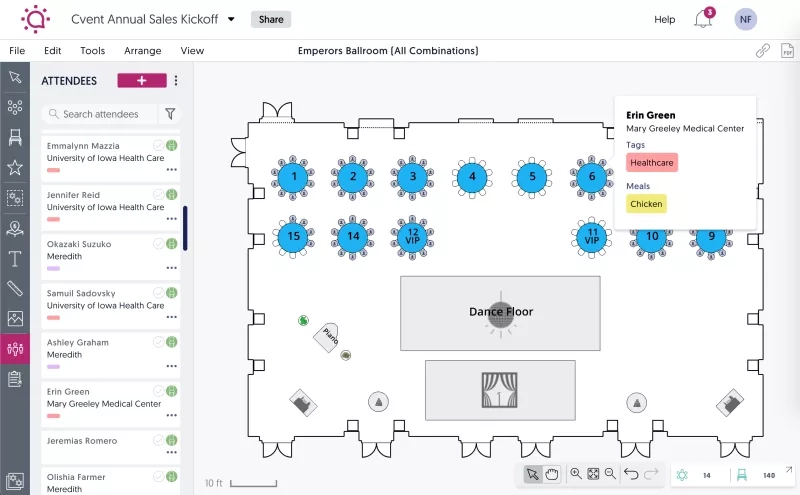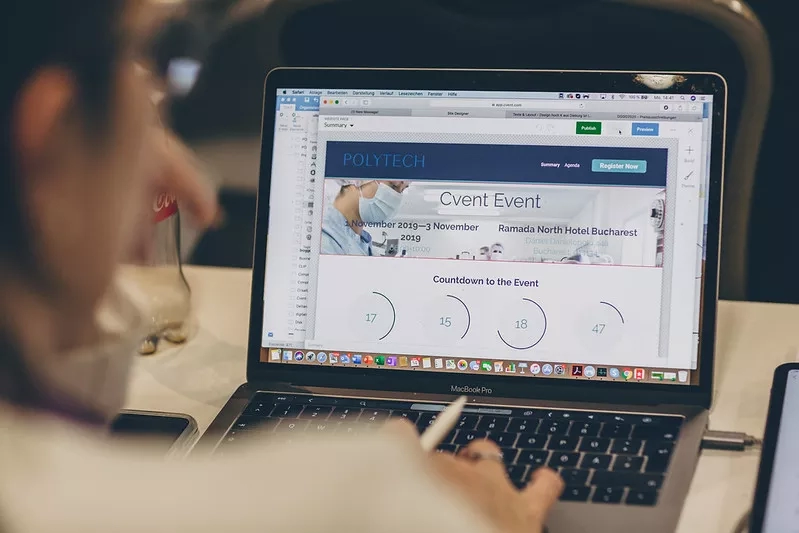The processes that marketers and planners used to rely on are growing and evolving. When you’re stuck in an excel dedupe or in a game of "phone tag" with a hotel to book additional rooms days before the event, you’ve probably thought – there has to be an easier way to do this. There is: event management software. You don’t need to pull your hair out managing room blocks or spend the night before an event printing out hundreds or thousands of name badges. With the various types of event management software available, you can create the right mix for you to decrease the time spent on manual tasks, increase productivity, and better prove event ROI. When researching and analyzing event management software, there are many options to consider and questions to ask.
Why Event Marketing™ and Management Software?
Technology is the key to planning successful meetings and events. What used to be a largely manual process has evolved as our reliance on technology has grown. Event management software saves time, provides increased data and analytics, cuts down on manual planning processes, and helps prove event success. But what is it? Event marketing and management software is any technology that aids in planning events. It has many facets, from event registration to mobile event apps, and there is a wide range of capabilities. While you can purchase different pieces of tech that satisfy immediate event needs, there are full platforms that offer everything an event planner could want when planning a meeting, event, or trade show. The benefit of a platform versus piecemeal solutions comes down to integrations, data and analytics, and ease of use.
Finding the Right Event Management Software
When trying to find the right event management software for your organization, you need to assess your individual needs. Meetings and events planners of all kinds benefit from event technology, but not all need the same features and functionality. From large organizations that throw hundreds of events a year to small organizations that put on one cornerstone event annually, every organization requires a different level of event tech. So how do you know what you may or may not want out of an event marketing and management platform? First, you need to understand what’s out there. Your biggest event planning challenges may have solutions you never knew existed. Once you understand what exists, you weigh the benefits of the various solutions. There are a few things to look for when evaluating providers.
What to look for in an event technology provider:
- One cohesive platform: This provides a one-stop-shop and keeps your needs with one team.
- A range of clients or organizations similar to your own: Does the provider specialize in small, social events? Large corporate ones? Does their tech scale?
- Great customer service: It takes time to onboard and learn new technology. Choose a provider that will be able to give you the tools to succeed and provide the needed support.
- A partner: Look for a company that doesn’t just want to hand off a product and never speak to you again. Product experts help planners become even better at planning events that make an impact—and thrive because of the valuable feedback from their customers.
Event Marketing and Management Solutions
Event marketing and management software is an all-in-one platform meant to solve all your planning needs. Finding the right one takes work – from understanding your needs to drilling into your budget. The fact is, while the benefits of an event marketing and management platform are obvious, from decreasing time spent on manual tasks, increased data and analytics, and better attendee engagement, technology comes with a price tag. A large-scale solution can generally be purchased in pieces. By looking at full-service providers you give yourself the option to add on solutions over time without experiencing integration issues or a large learning curve when picking up new products. Below, we’ll break down different solutions that are part of event marketing and management platforms that help at every stage of the event.
- Venue Sourcing™
- Seating and Diagramming
- Content Management
- Event Marketing and Email Marketing
- Event Registration Website
- Room Block and Travel
- Onsite Check-In and Badging
- Mobile Event App
- Appointments™
- Event Insights
Venue Sourcing
When planning a meeting or an event, one of the first (and most challenging) hurdles to overcome is finding the right venue. Whether you’re sourcing a convention hall or a hotel (or both!), finding the right place at the right price in the right city can be both stressful and time-consuming, not to mention making sure you're staying within budget and hitting deadlines. Venue sourcing tools simplify the venue search. Move away from basic internet searches and use a tool that can compare venues side by side and help you submit RFPs easily. Using a trusted venue sourcing tool can cut your venue search by allowing you to specify your search, reach out to venues more quickly, and manage those responses.
What to look for in a venue sourcing tool
- Request proposals from multiple venues with a single RFP
- Compare property details side by side
- Track and record savings from initial bid to final, negotiated price
- Take notes and upload photos from site visits
- Store and share a standard set of terms and conditions for venues to access and review
- Two-way communications with vendors that cuts down on phone tag and lost emails
- Load and track budget information
Seating and Diagramming
You have your venue, now it’s time to build the room. If you’re working off of outdated blueprints that aren’t to scale, you’re wasting precious planning time. Move past drawn layouts and find a solution that allows you to digitially diagram your room to scale. When it comes time to figure out seating, use technology that can integrate with registration tools. A great seating tool can allow you to improve flow, foster attendee networking opportunities and save valuable time while improving communication with your stakeholders. Most importantly, a diagramming and seating tool cuts down on manual processes to create better room plans and seating charts, all while allowing for collaboration with your stakeholders.
What to look for in a seating and diagramming solution:
- Has accurate event diagrams with integrated templates
- Has a 3D event designer
- Has simple, visual event seating plans
- Offers real-time collaboration with all event stakeholders
- Gives you the ability to download and print your event layout
Content Management
The agenda is the heart of your conference and plays a key role in attendee engagement. But the time and mental energy it takes to wrangle speakers and curate compelling content can suck the life out of a planner. That’s where abstract management software and speaker management software comes in. Content management allows you to gather abstracts in the same format so that it’s easier to make a selection. Then, when it comes to managing speakers, you’re able to use technology to automate speaker tasks so that you remove the potential for inconsistencies and human error.
What to look for in abstract management™ and speaker management software:
- Ability to collect, review, decide, publish abstracts to the final agenda
- Manage speaker tasks
- Send and receive key notifications
- Coordinate speaker activities
Event Marketing and Email Marketing
Event promotion is key to event success. Not only that, by understanding how your events fit into your marketing mix you can use events as a tool to drive business goals. Therefore, event marketing isn’t something to be ignored. Event marketing covers email marketing, social media promotion, a branded event website, event registration, and more and largely occurs before the event happens. Event marketing is the process of getting attendees to your event. But, it’s also the use of events as part of an organization’s marketing mix. When it is thought of as part of the marketing mix, data and analytics have a bigger role to play, as event success and improvement is critical. When it comes to getting the event started on the right foot, event marketing technology solutions are key.
What to look for in an email marketing tool:
- Customizable email templates to match your organization's branding
- Ability to schedule dates and times to send automated invitations, reminders, confirmations, and more
- Pre-populate contact data
- Track open rates and undeliverable rates
- Ensured delivery of readable emails by sending in multi-part MIME
- A/B Testing to determine most impactful messaging
Read the Marketer’s Guide to Getting Maximum Impact from Live Events.
Event Registration Website
An event isn’t an event without an event registration website. In order to get the word out about your event, you need to have a central hub that potential attendees can access that contains all event information. A great event registration website helps you increase registrations without the headaches associated with spreadsheets and paper forms. From managing invitees and registrants to multiple events, automation gives you the ability to do more with what you have. Even better? With an easy-to-use event builder, you don’t need to learn how to code to build a great event website.
What to look for in event registration website software:
- Can build custom and branded event websites
- Can restrict access rights to key individual
- Promotes event sponsors on your website
- Offers dynamic, multi-track, multi-session registration
- Provides modern registration page templates
- Allows simple event cloning
- Offers configurable restrictions and permissions
- Has self-serve registration that attendees can modify, cancel, and get refunds from
- Allows for a built-in content library for policies, brochures, maps, floor plans and more
- Has configurable event approval workflows
- Uses automated waitlists and capacity management
Room Block and Travel
Your event has a venue and a website. Now, you need to get attendees to the event and offer housing options. Setting up and managing room blocks can be time-consuming. A room block management tool allows you to manage room blocks and reduce the amount of communication needed with hotels. Room block and travel management tools make booking easier for attendees.
What to look for in a room block and travel management tool:
- Track pick-up and attrition across multiple hotels and/or multiple events at once
- Reduce back and forth communication with hotels by owning your room block data
- Create and customize your own booking sites for each event, controlling set-up, inventory, sub-blocks, etc.
- Offers a streamlined attendee experience
- Integrates with hotel reservation systems
Onsite Check-In and Badging
One of the most time-consuming activities for meeting and event planners is badge printing and stuffing. It is one of those activities that can force an all-nighter, and then the day of the event there are always typos on badges that require reprints. Another onsite stress? Lines at registration. By using an onsite check-in and badging tool you can cut down time spend printing badges, decrease waste, and eliminate stressful long lines at check-in—and make a fantastic first impression for your attendees.
What to look for in a check-in and badging tool:
- Wireless, on-demand badge printing
- Self-service kiosk
- Payments, extra sales, and donations
Mobile Event App
A mobile event app provides a content management system, allows for attendee engagement and exhibitor engagement, and a way to measure and prove event ROI. Attendees need their content all in one place – and you need an easy way to upload, organize and update all of that content. A mobile event app should provide schedules, maps, exhibitor and sponsor profiles, speaker bios, session-related content, and more to attendees. More than that, a mobile event app can grow your ROI through mobile sponsorships with valuable engagement touchpoints. Most importantly, a mobile event app needs to be intuitive and stable. Your provider needs to offer the metrics to prove your apps’ worth to your event partners, sponsors, and your own leadership team. The backend of your app should have dashboard functionality to track the metrics most important to you, your sponsors, and your stakeholders.
What to look for in a mobile event app:
- Push notifications
- Social media integrations, aggregated social feeds, social monitoring
- Gamification
- Attendee-to-attendee messaging
- Q&A and live polling
- Beacons
- Lead collecting + qualifying
- Additional sponsorship revenues
- Location-based notifications
- Uptime levels
- A native app for Android + Apple iOS devices PLUS an HTML5 web app
- 24/7 support
- Sponsorship opportunities
- Metrics + reporting
- Testing + QA
Live Polling and Survey Tools
Surveys fill in the gaps in the data you gather throughout the event. While you know with analytics how many attendees visited a session, live polling not only tells you immediately if the session was well-received, it increases engagement. Survey tools allow planners to determine if an event was successful during and after the event. Whether you need feedback on your latest user conference or employee training, or you want to know what your customers are thinking, online survey software can give you the insights you need to improve your business.
What to look for in a survey tool:
- Survey creation
- Survey reporting
- Survey templates
- Question types
- Mobile surveys
- Sample surveys
Appointments
Networking leads to opportunities. Live events are about face-to-face interactions and one of the quickest ways to prove event ROI for attendees is to provide unparalleled networking opportunities. Attendee engagement leads to event success. While most events offer networking happy hours, by using an appointment scheduling tool for one-on-one appointments, you can increase the effectiveness of onsite meetings. An appointment scheduling tool allows you to create groups of event participants and control how these groups can view and request meetings with each other. By using pre-booked appointments in an appointment scheduling tool, you can be confident that your attendees are fostering the relationships they’re looking for.
What to look for in an appointments tool:
- Pre-book meetings with customers and prospects
- Track ROI for your event program
- Facilitate attendee networking
- Manage staff scheduling tasks
Event Insights
Was your event a success if you don’t have the data to support it? Your boardroom won’t think so. And, without data, you don’t know how to improve your performance. A reporting and analytics tool allows you to track attendees onsite, capture data, and analyze that information all in one place. You will be able to better understand revenue opportunities that validate your event ROI while better understanding expressed interest. Reports can give you more event details before, during, and after your event to prove its value.
What features to look for in an event reporting and analytics tool:
- Session data
- Attendee tracking
- Data filters
- Registration and check-in data
- Lead capture
- Comparison reports
- Audience segmentation
- Account-based analytics
- Filtering and aggregation
Choose the Best Event Management Software for You
The options are endless. Mix-and-match, piecemeal, full platform. Only you understand the needs of your meetings and events program, and only you know your budget. There are hurdles to acquiring any new software and the procurement process can be challenging. It’s important to remember that when it comes to meetings and events, the planning process is changing. Event marketing and management software is no longer a nice-to-have, it’s a must-have. From cutting down manual processes to gathering data on attendees, event management technology can transform events. Staying on top of the different technologies means your events can have a bigger, trackable impact. Proving event success is based on data and analytics gathered throughout the event planning process. Event ROI is tangible. Create an actionable plan to acquire event technology so that you can scale and automate your event program. Choose the best event management platform for you.













